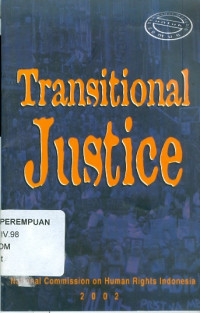
Text
Transitional justice
Transitional justice is rooted in accountability and redress for victims. It recognizes their dignity as citizens and as human beings. Ignoring massive abuses is an easy way out but it destroys the values on which any decent society can be built. Transitional justice asks the most difficult questions imaginable about law and politics. By putting victims and their dignity first, it signals the way forward for a renewed commitment to make sure ordinary citizens are safe in their own countries – safe from the abuses of their own authorities and effectively protected from violations by others. Mass atrocities and systematic abuses devastate societies and their legacy is likely to make conditions of the country fragile: Political and legal institutions like parliament, the judiciary, the police and the prosecution service may be weak, unstable, politicized, and under-resourced. The violations themselves will have severely damaged whatever confidence might have existed in the state to guarantee the rights and safety of citizens. And communities will often have been ripped asunder in the process and social or political organizations greatly weakened. Finding legitimate responses to massive violations under these real constraints of scale and societal fragility is what defines transitional justice and distinguishes it from human rights promotion and defense in general.
Availability
| KP.III.000325 | KP.III IND t | My Library | Available |
Detail Information
- Series Title
-
-
- Call Number
-
KP.III IND t
- Publisher
- Jakarta : Komisi Nasional Hak Asasi Manusia., 2002
- Collation
-
viii, 28 hal ; 18 cm
- Language
-
Indonesia
- ISBN/ISSN
-
-
- Classification
-
KP.III
- Content Type
-
-
- Media Type
-
-
- Carrier Type
-
-
- Edition
-
-
- Subject(s)
- Specific Detail Info
-
-
- Statement of Responsibility
-
-
Other version/related
No other version available
File Attachment
Comments
You must be logged in to post a comment
 Computer Science, Information & General Works
Computer Science, Information & General Works  Philosophy & Psychology
Philosophy & Psychology  Religion
Religion  Social Sciences
Social Sciences  Language
Language  Pure Science
Pure Science  Applied Sciences
Applied Sciences  Art & Recreation
Art & Recreation  Literature
Literature  History & Geography
History & Geography